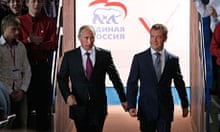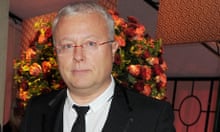Vladimir Putin is to run for president of Russia next year in a move that could keep the powerful leader at the helm of the country until 2024.
Prime minister Putin and head of state Dmitry Medvedev ended months of speculation on Saturday during the ruling United Russia party congress.
"I think it's right that the party congress support the candidacy of the head of the government, Vladimir Putin, in the role of the country's president," Medvedev said. Thousands of flag-waving delegates inside Moscow's Soviet-era Luzhniki stadium gasped before breaking into applause.
Russia has been paralysed by months of speculation regarding the decision, though signs had recently emerged that Putin would announce his intention to return to the Kremlin seat. Putin, who has worked hard to prevent a credible opposition from forming, is all but certain of winning the presidential vote that is set for March, raising further concerns over the growth of soft authoritarianism in the country. The announcement is also likely to dismay the combative prime minister's numerous critics in the west.
In a surprise twist, Medvedev said he was ready to serve as prime minister under Putin. Medvedev will head the party list of United Russia as it readies for parliamentary elections in December, paving the way for the premiership.
"I'm ready to head this government and work for the good of the country," he said, adding that such a move was dependent on United Russia sweeping the parliamentary vote, he said. United Russia has seen its popularity decrease sharply since the financial crisis hit, but it remains the country's most influential party, created with the aim of supporting Putin.
The swapping of roles would be the clearest illustration yet of Russia's so-called "managed democracy", a term coined by Kremlin ideologues to describe Russia's political system.
Putin, who served as president from 2000 to 2008, remains the country's most popular leader, albeit with the help of a carefully controlled media. Under constitutional changes adopted by Medvedev upon coming to office as Putin's hand-picked successor, Putin will serve for another six years. A possible second term after that would keep him in the Kremlin beyond his 71st birthday.
The former KGB agent appeared to enjoy the acclaim yesterday.
"I want to thank you for the positive reaction to the proposal for me to stand for Russian president," Putin said. "For me this is a great honour." He launched into an electoral programme that focused on addressing the stagnant economy.
A return to the Kremlin will hand Putin back formal control over foreign policy. Relations with the west plummeted when he was president.
Russia's opposition denounced the move, despite having expected it. "All authoritarian regimes are the same," said Lyudmila Alekseyeva, the 82-year-old doyenne of Russia's human rights community. "Either they have to modernise or they come crashing down, as happened with Gaddafi."




Comments (…)
Sign in or create your Guardian account to join the discussion